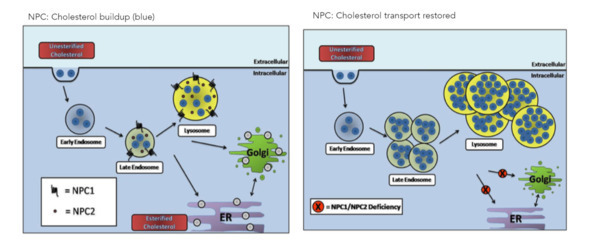A New Drug Therapy for Lysosomal Storage Disease
Inventor: Dr. Kevin Vaughan
Date added: October 3, 2020
Overview
A potential therapeutic for Niemann Pick Type C disease that rescues proper cholesterol transport within the cell.
Technology Summary
Niemann Pick diseases are 1 of 45 types of the orphan lysosomal storage diseases (LSDs) and currently have no known cures. Specifically, Niemann Pick Type C (NPC) disease is characterized by inability of the body to transport cholesterol and other fatty substances inside of cells, which leads to the abnormal accumulation of these substances within various tissues of the body. Most NPC treatment research has focused on removing accumulated cholesterol from the lysosome, but these approaches have marginal benefit and cause serious side effects including irreversible hearing loss. Recently, therapies aimed at correcting the proteins encoded by mutant NPC genes have made it to clinical trials, but the benefit in humans is not known.

Researchers at the University of Notre Dame have recently identified a novel therapeutic for lysosomal storage diseases, such as NPC. The drug operates by correcting cholesterol transport dysfunction, rather than seeking to remove accumulated cholesterol from the lysosome. The therapeutic proposed by researchers at Notre Dame represents a better alternative to current NPC therapeutics because it corrects the natural process of cholesterol transport, has little to mild side effects, and can be administered non-invasively.
Market Advantages
• Effective NPC therapeutic that attacks mechanism of cholesterol transport
• Non-invasive administration of drug via IV or pills 3x a day
Market Opportunity
• $30M US Market for Niemann Pick Type C Treatment
• Global Market approximately 3 to 4 times larger
Disease Community Developments
• Global patient registry currently being populated
• Current effort to get NPC on the RUSP
• Biomarker research is a priority to help with trial results in the near future
Technology Readiness Status
TRL2 - Technology Concept Formulated
Contact
Richard Cox
rcox4@nd.edu
574.631.5158